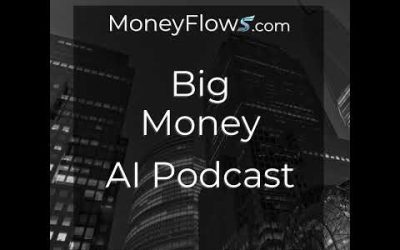by Louis Navellier
January 14, 2025
At the annual Consumer Electronics Show (CES) in Las Vegas last week, Nvidia’s CEO Jensen Huang delivered the keynote speech. Huang’s presentation provided an update on its new AI chips, including its new GB10 super-chip. Nvidia is increasingly involved with making specialty chips for robotics and other AI applications. Jensen also debuted a new sparkly leather jacket that was appropriate for Las Vegas and reinforced his superstar status! Naturally, Nvidia’s stock is benefiting from Jensen’s leadership and Nvidia’s AI leadership. I should add that Nvidia is by far my largest holding in managed accounts.
Nvidia is just one example of an American stock that has captivated global attention, especially as Trump 2.0 is about to take over. The prospects for the American economy and American-run companies are light years ahead of any other nation or economy. For instance, in our neighbor to the north, Canada’s Prime Minister Justin Trudeau just resigned as the leader of the Liberal Party. He said that he will stay on until March 24th, when a successor can be appointed, but Trudeau never recovered from his visit to Mar-a-Lago and Donald Trump’s tweet that Canada could become America’s “51st state.” Ironically, some of the conservative provinces like Alberta and Saskatchewan are open to becoming part of the U.S., so it will be interesting to see how the balance of power may shift in Canada during their upcoming election process.
Greenland is also back in play, and some are calling for that massive island to break away from Denmark. All this is happening before Trump’s second term even begins. After inauguration day next Monday, President Trump is expected to launch a “shock and awe” campaign that may surprise the world and probably many folks in the U.S. as well. This anticipation is making many investors excited for 2025.
To start the year, we will likely prosper from another exciting earnings announcement season. After that, the best hope is that Trump 2.0 will stimulate the U.S. economy and end senseless wars, as the U.S. is about to throw its economic weight around and slap tariffs on countries that do not practice fair trade.
The immediate impact will be a surging U.S. dollar, which helps to suppress inflation on commodities and imported goods. Bond yields may soon begin to decline as inflation fizzles and central banks around the world continue to shore up their weak currencies as well by cutting interest rates to stimulate economic growth. Our Fed will likely follow other central banks, like the ECB, and cut up to four times in 2025.
When you look around the world, chaos reigns in many countries. The latest example is in Britain, where Prime Minster Keir Starmer and his Energy Secretary, Ed Miliband, are now prohibiting new licenses for major energy companies to boost exploration in the North Sea, which will hurt Scotland and renew calls for Scottish independence from these policies emanating from 10 Downing Street. No matter how much green energy a country enforces, green energy fizzles during the winter months in Northern Europe, when the sun does not shine for more than a few hours and the wind blows less often, so even though Britain is following Germany to install even more wind and solar units, when half of British households have to be subsidized to help pay their expensive power bills, something is horribly wrong with their energy policies.
The new British ambassador to the U.S., Lord Peter Mandelson, has been openly hostile to President-elect Trump and has been dubbed the “Prince of Darkness” by the British media. I suspect that Mandelson may have met his match in negotiating tariffs under Trump 2.0, but the biggest disagreement may be over Ukraine, which recently hurt itself when it decided not to renew the transit fees it received from Russia to transport natural gas through Ukraine that supplied Austria, the Czech Republic, Hungary and Slovakia. Ukraine may now need even more financial aid after losing almost a billion dollars in annual transit fees.
Britain is much more vested in supporting Ukraine than Donald Trump, who thinks the Russia/Ukraine war is a horrible waste of lives and infrastructure. As a result, the “special relationship” that Britain and the U.S. have shared is now in jeopardy, especially if Lord Mandelson remains ambassador to the U.S.
All this points to why the U.S. dollar is so strong, while most other currencies are falling, and their countries are in recession. That’s why the euro will likely “break a buck” relative to the U.S. dollar in the upcoming months. Additionally, the British pound may fall to $1.15 to the U.S. dollar later this year.
Practically speaking, a strong U.S. dollar impedes sales in the multi-national stocks in the S&P 500, where approximately half of their revenue is outside the U.S. As a result, domestic stocks tend to prosper in a strong U.S. dollar environment, giving an advantage to the small-to-mid-capitalization companies.
Elon Musk doesn’t have any official ambassador status, but he has been exerting his political influence in Europe through his “X” postings. Last Tuesday, The Wall Street Journal said that Musk has been “throwing grenades into Europe’s political mainstream over issues ranging from immigration to free speech, creating a dilemma for Britain, France and Germany.” Since Musk is now an official Trump advisor, European politicians prefer to criticize Musk instead of irritating the President-elect directly. There is no doubt that Musk is trying to influence Germany’s upcoming election, pushing the AfD party while stirring the pot other nations, pushing British and French leaders to defend themselves as their popularity collapses.
Weak European currencies have caused consumer inflation to rise to a 2.4% annual pace in the euro-zone, which is above the European Central Bank’s (ECB) 2% target rate. However, since the euro-zone is in recession, the ECB is still expected to continue to cut key interest rates an additional 4-5 times in 2025.
The U.S. Economy Begins 2025 Strongly – As Reflected in the ISM and Jobs Reports
Last Tuesday, ISM announced that its non-manufacturing (service) index rose to 54.1 in December, up from 52.1 in November. Any reading over 50 signals an expansion and the ISM service index has been above 50 for 52 of the last 55 months, so the service sector continues to drive U.S. economic growth.
Especially encouraging is that the business activity component surged to 58.2 in December, up sharply from 53.7 in November. Nine of the 15 service industries that ISM surveyed reported an expansion in December. I expect more service industries to turn positive under Trump 2.0 in the upcoming months.
The ISM manufacturing sector – which has contracted for 25 of the past 26 months – showed some signs of life in December when the new orders component rose to its highest level in over two years. If Trump 2.0 can repair the beleaguered manufacturing sector with “drill baby drill” and other pro-business policies, then 4% annual U.S. GDP growth is possible, especially if he could end the Ukraine war and maybe the Middle East conflict as well and deliver a “peace dividend,” generating up to 5% GDP growth.
Turning to the volatile jobs data, released at the start of each month, ADP announced on Wednesday that 122,000 private payroll jobs were created in December, which was below economists’ consensus estimate of 139,000. This was the smallest increase in the ADP private payrolls since August. But the more widely watched Labor Department job report, announced on Friday, said that a whopping 256,000 payroll jobs were created in December, substantially higher than the economists’ consensus estimate of 165,000.
The unemployment rate dropped a notch to 4.1% in December, down from 4.2% in November. Average hourly earnings rose 0.3% to $35.69 per hour in December and have risen 3.9% in the past year. About 43,000 retail jobs were added for the holiday shopping season, so it will be interesting to see if these jobs will disappear in the upcoming months. Overall, over two million payroll jobs were added in 2024.
These ISM and jobs reports point to a recovering economy as the Trump 2.0 era begins. In contrast, the economic news emanating from Europe is very depressing, indicating a recession there. For example, German factory orders plunged by 5.4% in November, according to Destatis. Another example is that the economic sentiment index for the euro-zone declined to 93.7 in December, down from 95.6 in November. Consumer sentiment in France declined to 89 in December, from 90 in November, due to layoff fears.
America has many problems, of course, lately centered on wildfires, storms and random acts of terror. Thousands of homes are destroyed by fire in California while others are frozen by an Artic Blast that has caused multiple states to declare an emergency. As a result, travel will be treacherous in many states and natural gas prices will remain high due to record demand. Higher natural gas prices naturally encourage drilling, plus Trump’s “drill baby drill” policies to boost natural gas production and LNG exports.
These horrific fires in Los Angeles may eventually rival Hurricane Katrina in New Orleans 20 years ago as the costliest natural disaster in U.S. history. Although the cuts to the Los Angeles Fire Department and the fact that many fire hydrants have run out of water are dominating the news, the saddest fact is that many homeowners have lost their fire insurance, partly due to a dispute with Cal Fire, the state-run fire control agency. I used to have AIG insurance for our family home out West and we liked them since they dispatched their fire trucks to spray fire retardant on our homes when any fire threatened. But Cal Fire was very upset that insurance companies were doing Cal Fire’s job for them and hindering their overtime pay, so AIG and other homeowner insurance companies were run out of California and Northern Nevada, where Cal Fire has immense influence. Private fire protection could become a growing business after these L.A. fires, unless Cal Fire tries to ban them, as happened to other home insurance companies. (I should add that one of my stocks, Perimeter Solutions (PRM), makes fire retardant that will be in strong demand).
Navellier & Associates owns Nvidia Corp (NVDA), in managed accounts. A few accounts own American International Group, Inc. (AIG), per client request. Louis Navellier and his family own Nvidia Corp (NVDA), via a Navellier managed account, and Nvidia Corp (NVDA), in a personal account. He does not personally own American International Group, Inc. (AIG).
The post 1-14-25: The U.S. is Still the Major Magnet for the World’s Wealth appeared first on Navellier.





